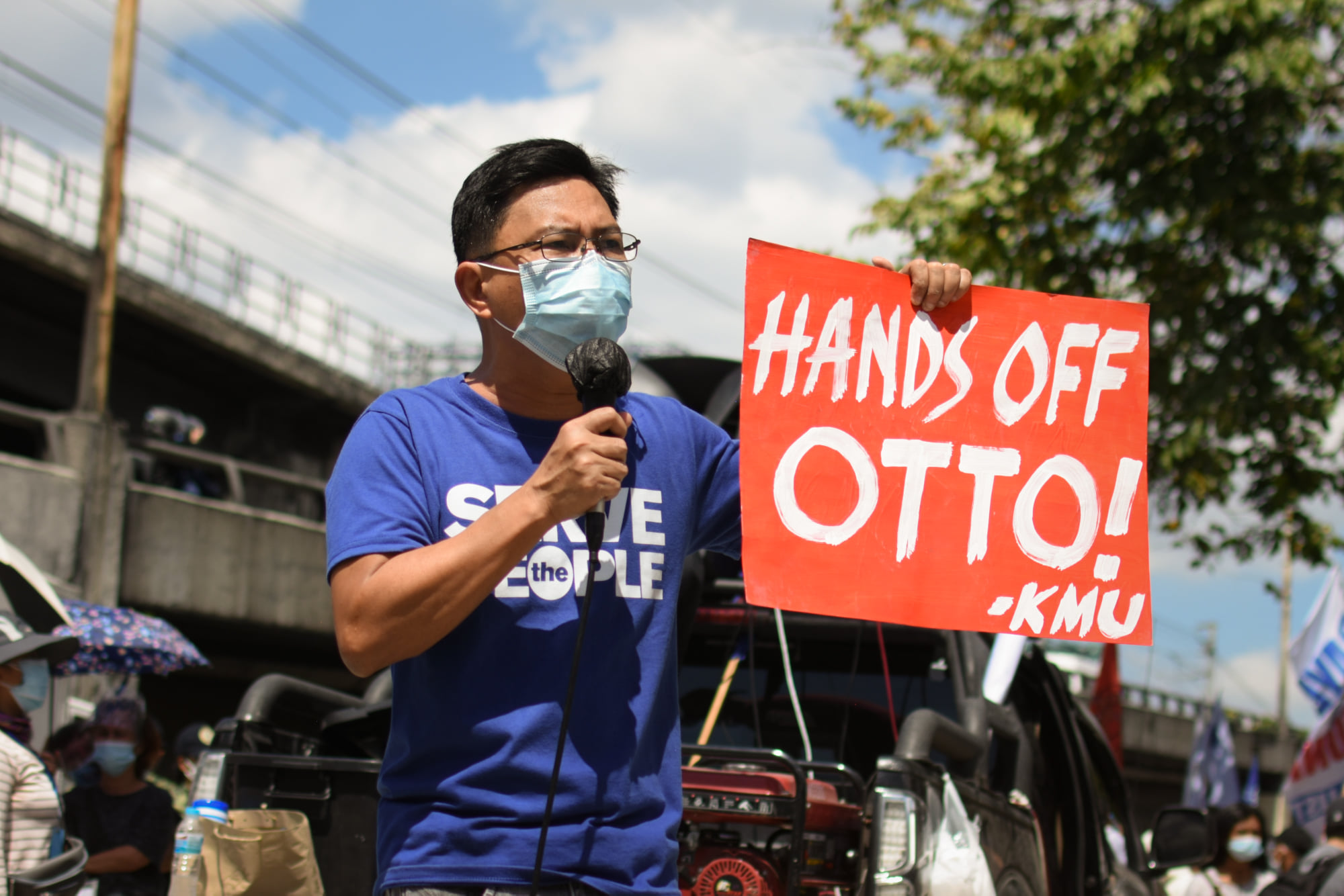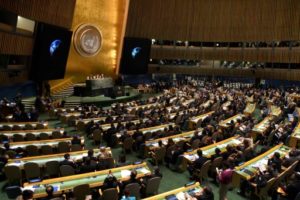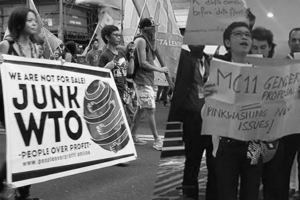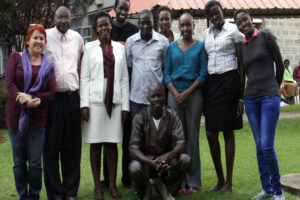In photo (© Bulatlat): A unionist in the Philippines shows support for Otto de Vries.
IBON International stands in solidarity with peoples’ movements in the struggle for rights, democracy and sovereignty against worsening economic conditions and militarist trends. Today, states respond with violence against the heightening clamour for system change, from the attacks against workers, farmers and minorities opposing neoliberal policies in India and Indonesia, in the militarist regimes in Burma, Thailand and Haiti, and in the revitalization of counterterrorism laws that target activists in Hong Kong and the Philippines.
With the ongoing Philippine Supreme Court discussions on petitions against the Terror Law, and the recent opening of the 46th Regular Session of the UN Human Rights Council (UNHRC), we reiterate people’s calls for state accountability in the Philippines, to stop state-led killings, rights abuses, and attempts to cut international solidarity and support.
State repression against the people is intensifying. The Duterte administration’s militarism and capture of all government branches – with ex-generals appointed in cabinet positions, a supermajority in the legislature, and certain local courts turned into warrant factories – enable it to wage a systematic attack against rights defenders, people’s organisations and civil society through brute force or “legal” measures. Killings continue under the false drug war and the counter-insurgency program. Peasant and Indigenous People’s lands are bulldozed and bombed. People’s organisations, civil society, and even progressive lawmakers are threatened under the Anti-Terrorism Act.
With the ongoing Philippine Supreme Court discussions on petitions against the Terror Law, and the recent opening of the 46th Regular Session of the UNHRC, we reiterate people’s calls for state accountability in the Philippines, to stop state-led killings, rights abuses, and attempts to cut international solidarity and support.
State measures discouraging international support
Recently, a research organisation of labour rights advocates, the Ecumenical Institute for Labor Education and Research (EILER) was “red-tagged.” One of its long-time volunteers, 62-year-old Dutch Catholic missionary Otto de Vries is being forced to leave the country after his permanent resident visa was cancelled over malicious accusations of involvement in activities by “communist terrorist front organisations.”
Since 1991, Otto has been living with workers in urban poor communities in the Philippines, following his religious calling to serve the poor. Otto is being forced to leave the country in 30 days since he received the order on February 3. We recall that this is not the first time the government has harassed elderly religious volunteers, with the deportation of Australian missionary and humanitarian worker Sister Patricia Fox in 2018.
IBON International condemns the Duterte government’s new red-tagging spree against people’s organisations and civil society. Under the government’s counter-insurgency program and Anti-Terror Act, red-tagging vilifies people’s organisations and civil society, and hampers their humanitarian and development initiatives. The repressive move against Otto on false and baseless accusations is proof that “terrorism” is used as a catch-all category against organisations or individuals that the government deems disagreeable.
Red-tagging is also proven to harm people’s lives. Many community leaders, activists and rights defenders were red-tagged before they were killed by state forces or unidentified assailants such as in the case of community health worker Zara Alvarez in Negros province.
We decry the government’s attempt to cut grassroots international solidarity for the Philippines by targeting international advocates of workers’ rights and people’s development. We enjoin civil society and people’s organisations around the world to express their support to Otto, and demand that the Philippine government overturn the unjust deportation order.
The government also recently issued a note stating that foreign government funding to non-government organisations should be coursed through the foreign affairs department for “clearance.” This shows a focus on blocking civil society, and the work of critical voices, through bureaucratic processes. We are concerned that the government’s interception of funds intended for civil society initiatives would further heighten militarism, as witnessed in the government’s militarised pandemic responses.
Under the government’s counter-insurgency program and Anti-Terror Act, red-tagging vilifies people’s organisations and civil society, and hampers their humanitarian and development initiatives. The repressive move against Otto on false and baseless accusations is proof that “terrorism” is used as a catch-all category against organisations or individuals that the government deems disagreeable.
Terror law versus peasants, IP, and civil society
IBON International also joins people’s movements and civil society in opposing the Anti-Terror Act. We reiterate that the law should be junked as it is used against peasants, Indigenous Peoples (IP), and civil society to stifle dissent and facilitate corporate plunder. We decry the continuing cases of attacks against farmers and IPs, which exacerbate landlessness and poverty, and only serve the corporate agribusinesses, mining, and the local elite.
Two Indigenous People’s rights advocates who filed petitions against the law in 2020 were recently arrested. A bounty of PhP 100,000 and a shoot-to-kill order was issued by the police against Indigenous leader Windel Bolinget before he submitted himself to police custody. Volunteer teacher Chad Booc was among the 26 individuals arrested in the raid of a university in Cebu province where the Indigenous Lumad took refuge after they were displaced from their ancestral lands in Mindanao, southern Philippines for foreign mining interests. A leader of fisherfolk group Pamalakaya was arrested over trumped-up charges of “crimes against humanity” as part of recent spate of arrests against activists in Agusan del Norte, Mindanao.
Two Indigenous Aeta People, first slapped with false charges and illegally detained under the Anti-Terror Act last August 2020, initially filed a petition against the law through the legal counsel of the National Union of Peoples’ Lawyers (NUPL). However, the government unilaterally took over as their new legal representatives to retract the said petition, instead of just junking the baseless charges against the Indigenous Aeta.
In late February 2021, officials of the Cordillera region in northern Philippines issued a resolution towards conducting “drug war style” operations against so-called “left personalities.” Signed by more than 40 officials, this furthers the systematic legitimisation of state violence against IP and activists.
These all add to the record of state killings in the past months: from the killings of a peasant leader and petitioner against the Anti-Terror Act in early February, to the late-December 2020 massacre of nine Indigenous Tumandok People fighting the construction of the Jalaur mega-dam which would submerge their communities, including their agricultural lands and cultural sites.
We reiterate the people’s call for a UN investigation on the killings and rights abuses in the country to help facilitate mechanisms for accountability. We recall the recommendations of the 2020 Bachelet report on the Philippine situation, and invoke the findings of the International Criminal Court that crimes against humanity including murder, torture and other inhumane acts were committed by Duterte’s government in relation to the drug war.
We call on the international community to further strengthen their solidarity for the Philippines and to condemn Duterte’s killings and rights violations against the Filipino people. With government moves at the UNHRC to obscure the “drug war” killings as results of mere on-ground negligence and “failure to follow protocol,” we echo rights groups in attributing direct accountability to top policy-makers and enforcers of the Duterte administration—including the President himself, as chief executive.
We reiterate the people’s call for a UN investigation on the killings and rights abuses in the country to help facilitate mechanisms for accountability. We recall the recommendations of the 2020 Bachelet report on the Philippine situation, and invoke the findings of the International Criminal Court that crimes against humanity including murder, torture and other inhumane acts were committed by Duterte’s government in relation to the drug war.
Military aid to the Philippine government should be stopped amid its rampant rights violations. These resources would only be used to intensify the government’s attacks against the people as shown in its militarist COVID-19 response and bloated budget of the agency leading the counter-insurgency program.
We enjoin them to support people’s initiatives for justice and accountability such as the movement against the Anti-Terror Act as well as Investigate PH, a civil society-led international investigation on the rights violations in the country. International solidarity for the Philippines is especially critical amid the failure of domestic accountability mechanisms—as seen in the justice department’s recent investigation process on the drug war that excluded victims, people’s organisations, civil society and even the rights commission. In the end, the government must not be allowed to whitewash the dire rights situation.###



